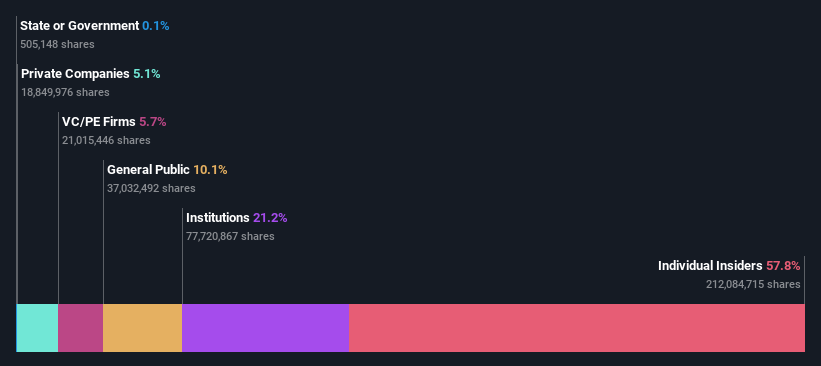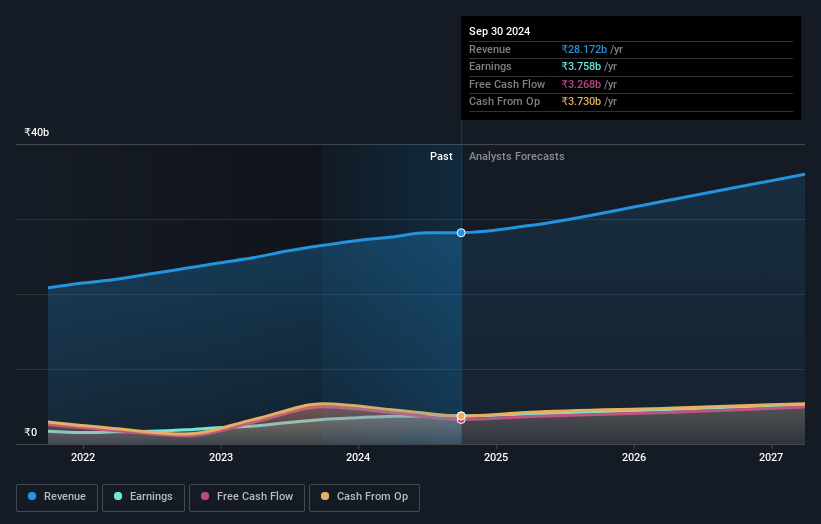- India
- /
- Household Products
- /
- NSEI:JYOTHYLAB
Jyothy Labs Limited's (NSE:JYOTHYLAB) Top Key Executive Moothedath Ramachandran is the most upbeat insider, and their holdings increased by 3.4% last week

Key Insights
- Jyothy Labs' significant insider ownership suggests inherent interests in company's expansion
- 53% of the business is held by the top 4 shareholders
- 21% of Jyothy Labs is held by Institutions
If you want to know who really controls Jyothy Labs Limited (NSE:JYOTHYLAB), then you'll have to look at the makeup of its share registry. With 58% stake, individual insiders possess the maximum shares in the company. In other words, the group stands to gain the most (or lose the most) from their investment into the company.
As a result, insiders were the biggest beneficiaries of last week’s 3.4% gain.
Let's delve deeper into each type of owner of Jyothy Labs, beginning with the chart below.
See our latest analysis for Jyothy Labs

What Does The Institutional Ownership Tell Us About Jyothy Labs?
Many institutions measure their performance against an index that approximates the local market. So they usually pay more attention to companies that are included in major indices.
Jyothy Labs already has institutions on the share registry. Indeed, they own a respectable stake in the company. This implies the analysts working for those institutions have looked at the stock and they like it. But just like anyone else, they could be wrong. When multiple institutions own a stock, there's always a risk that they are in a 'crowded trade'. When such a trade goes wrong, multiple parties may compete to sell stock fast. This risk is higher in a company without a history of growth. You can see Jyothy Labs' historic earnings and revenue below, but keep in mind there's always more to the story.

Jyothy Labs is not owned by hedge funds. Because actions speak louder than words, we consider it a good sign when insiders own a significant stake in a company. In Jyothy Labs' case, its Top Key Executive, Moothedath Ramachandran, is the largest shareholder, holding 39% of shares outstanding. For context, the second largest shareholder holds about 5.7% of the shares outstanding, followed by an ownership of 3.9% by the third-largest shareholder. Furthermore, CEO Moothedath Jyothy is the owner of 2.6% of the company's shares.
To make our study more interesting, we found that the top 4 shareholders control more than half of the company which implies that this group has considerable sway over the company's decision-making.
While it makes sense to study institutional ownership data for a company, it also makes sense to study analyst sentiments to know which way the wind is blowing. There are a reasonable number of analysts covering the stock, so it might be useful to find out their aggregate view on the future.
Insider Ownership Of Jyothy Labs
The definition of company insiders can be subjective and does vary between jurisdictions. Our data reflects individual insiders, capturing board members at the very least. Management ultimately answers to the board. However, it is not uncommon for managers to be executive board members, especially if they are a founder or the CEO.
I generally consider insider ownership to be a good thing. However, on some occasions it makes it more difficult for other shareholders to hold the board accountable for decisions.
Our information suggests that insiders own more than half of Jyothy Labs Limited. This gives them effective control of the company. Insiders own ₹86b worth of shares in the ₹148b company. That's extraordinary! Most would be pleased to see the board is investing alongside them. You may wish to discover if they have been buying or selling.
General Public Ownership
The general public-- including retail investors -- own 10% stake in the company, and hence can't easily be ignored. This size of ownership, while considerable, may not be enough to change company policy if the decision is not in sync with other large shareholders.
Private Equity Ownership
With a stake of 5.7%, private equity firms could influence the Jyothy Labs board. Some might like this, because private equity are sometimes activists who hold management accountable. But other times, private equity is selling out, having taking the company public.
Private Company Ownership
Our data indicates that Private Companies hold 5.1%, of the company's shares. It might be worth looking deeper into this. If related parties, such as insiders, have an interest in one of these private companies, that should be disclosed in the annual report. Private companies may also have a strategic interest in the company.
Next Steps:
While it is well worth considering the different groups that own a company, there are other factors that are even more important. Case in point: We've spotted 1 warning sign for Jyothy Labs you should be aware of.
But ultimately it is the future, not the past, that will determine how well the owners of this business will do. Therefore we think it advisable to take a look at this free report showing whether analysts are predicting a brighter future.
NB: Figures in this article are calculated using data from the last twelve months, which refer to the 12-month period ending on the last date of the month the financial statement is dated. This may not be consistent with full year annual report figures.
New: Manage All Your Stock Portfolios in One Place
We've created the ultimate portfolio companion for stock investors, and it's free.
• Connect an unlimited number of Portfolios and see your total in one currency
• Be alerted to new Warning Signs or Risks via email or mobile
• Track the Fair Value of your stocks
Have feedback on this article? Concerned about the content? Get in touch with us directly. Alternatively, email editorial-team (at) simplywallst.com.
This article by Simply Wall St is general in nature. We provide commentary based on historical data and analyst forecasts only using an unbiased methodology and our articles are not intended to be financial advice. It does not constitute a recommendation to buy or sell any stock, and does not take account of your objectives, or your financial situation. We aim to bring you long-term focused analysis driven by fundamental data. Note that our analysis may not factor in the latest price-sensitive company announcements or qualitative material. Simply Wall St has no position in any stocks mentioned.
About NSEI:JYOTHYLAB
Jyothy Labs
Engages in the manufacture and marketing of fabric care, dishwashing, personal care, and household insecticides products in India and internationally.
Flawless balance sheet average dividend payer.
Market Insights
Community Narratives



